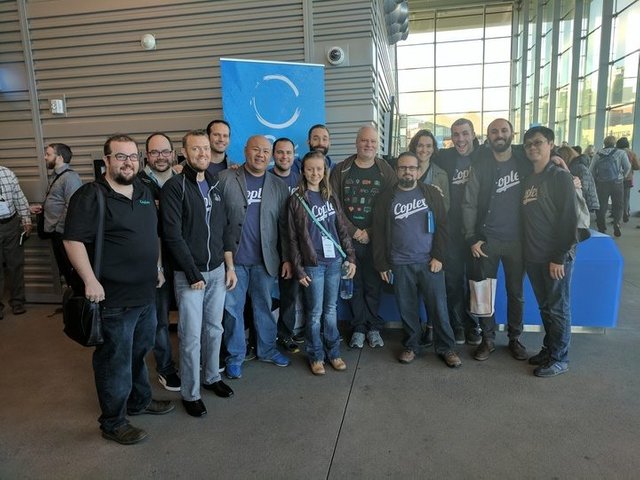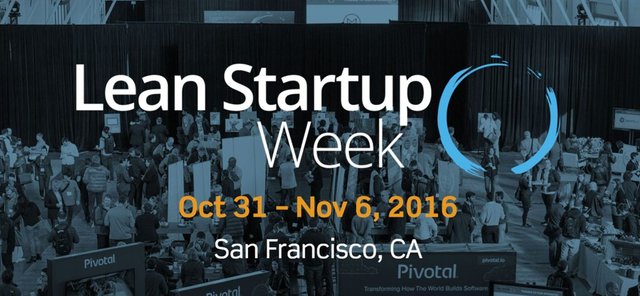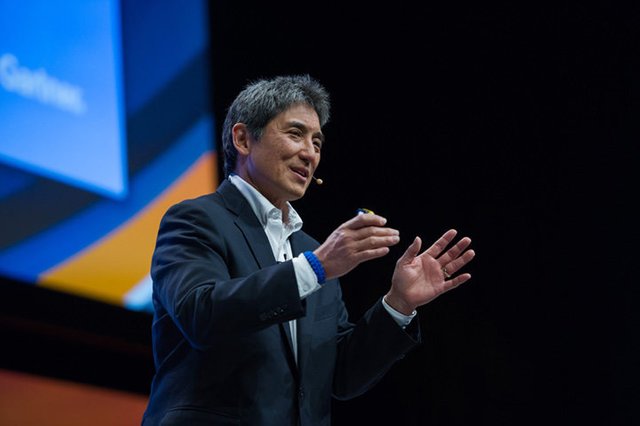Takeaways From My First Lean Startup Week Conference - Part 1
After 2 years in the startup industry, I was thrilled to spend time in San Fransisco learning from Eric Ries, Guy Kawasaki, Steve Case, Jeff Gothelf, and SO many other bright minds who apply lean methodology.
What is Lean Startup Week?
This conference is centered around the Lean Startup methodology outlined by Eric Ries in his book. Thought leaders, "star practitioners" in large companies, and startups from all across the world come together to learn how to apply lean thinking in new, innovative ways to change the world. Visit the conference website for more information.

(That's me in the middle.)
For my very first Lean Startup Week, I went with some of my team at Coplex, a Los Angeles and Phoenix-based Startup Studio. The two days went by in a flash, but boy did I learn a lot. These are the biggest lessons that I gained from the keynote speakers and breakout sessions. (Part 2 will be posted soon.)
Lesson 1: "Innovators have to ignore naysayers."
This one came straight from Guy Kawasaki, current chief evangelist at Canva (formerly at Apple). When it comes to entrepreneurship, it's going to be hard. Customers don't know what they want and they won't know how to tell you. Innovators have a unique duty to get down and dirty to figure things out, and it's likely going to come with negativity and resistance. Most people aren't immediately inclined to break the status quo, but that shouldn't discourage you.Lesson 2: Assumptions are your worst enemy.
This was a reoccurring theme throughout the Lean Startup Conference. It's common for people to jump to conclusions based on their limited/skewed worldview, but that is a kiss of death to a startup. Some advice given to avoid making assumptions:- Talk to your customers! Find out what their pain points are and solve them. Jeff Gothelf, author of Lean UX, wisely pointed out, "If you don't talk to customers, you don't know if you're meeting market need." Get feedback early and often and when you give your customers what they want, they'll be loyal.
- Constantly look for and challenge assumptions. Force yourself to see things from other peoples' perspectives, question your motives and knowledge, and constantly ask, "why?" In fact, this ties into a principle directly from the Lean Startup book -- for every matter, ask why five times. Seriously, if you haven't read the book, I strongly recommend it.

Lesson 3: Design thinking is problem solving.
Irene Au, former head of design at Google, Yahoo, and Udacity made some incredibly insightful points about the role of good design in lean product development.- Good design reduces cognitive load and promotes good will towards others. Bad design is everywhere and it causes unnecessary drain on mental capacity.
- "Good design is like a refrigerator. When it works you don't notice it. But when it fails, it stinks." Design should incorporate so seamlessly into everyday life that the user of a product should never even notice it. She noted, "Designers have the power to make people feel good."
(This reminded me of one of my favorite books, The Life-Changing Magic of Tidying Up. It may seem cheesy to some but it encourages readers to throw away things that don't bring joy. Every time you interact with an object you dislike, a little bit of energy is wasted. That adds up when there are dozens of encounters with poorly designed products throughout the day. While this may not always be attributed to the design, poor design choices can have a lasting, negative ripple effect.)
- "Design is a manifestation of self....Well-designed objects help us grow into our better selves." I enjoyed that she encouraged people to challenge themselves to design products that propel society forward (instead of garbage to make a quick buck -- it negatively affects everyone in the end).

Wait a minute. You said this was the Lean Startup Conference... Where are the lessons in "lean?"
By now you've probably noticed that these lessons aren't directly related to Eric Ries' "Lean Startup" methodology. I was a little disappointed, too, that these speakers really grazed over the topic... especially since the entire week was supposed to be devoted to it! Still, there were some incredibly valuable nuggets worth sharing.
Lesson 4: "Treat everyone like it's their birthday."
This wasn't my favorite presentation, but Caterina Rizzi's birthday cake theme taught me a few things:- Little things go a long way to foster loyalty. Think about times when someone did that "little something extra." It's memorable and you feel much more connected afterward. It could be a coworker who brought you coffee because he knew you've been pressed for time all week or perhaps it was a company who sent a personalized note to thank you for supporting a small business. (Maybe even that person who messaged you directly to share how much they enjoyed your blog post.) Looking for these opportunities is going to create stronger, more genuine relationships.
- Consider the beginning, middle, and end of the customer experience. Anticipating what a user might need is directly tied into good design.
- Embrace your haters. Often times, people that are constantly complaining or bringing up issues are those that really care about your product/business. (Yes, even if they're super annoying.) Take what they say seriously to continue to grow and make necessary innovations.

Lesson 5: Constantly reflect on the journey.
In the most authentic, candid presentation of the day, Rand Fish, founder of Moz, shared the list you should constantly be answering:- Things you'd change.
- Things you'd keep the same.
- Things you don't yet know.
This list will keep you aware of what you're doing, where you want to go, and how to improve along the way. Without constantly addressing your failures, strengths, and the unknowns, it's nearly impossible to reach your goals. This applies to everyone, not just entrepreneurs.
Stay tuned for Part 2!
If something caught your eye, chat with me in the comments. Follow me for the next post about the top takeaways from the rest of the Lean Startup Week.
All the best,
Britt


Hello @sharingeverybite,
It gives us pleasure to inform you that this post have been upvoted by Project Better.
The Mission of Project Better is to reward posts have many votes from Minnows but earn pennies.
Your payout is $0.022 before we vote on your post.
Learn more about the Project Better here! ,
Want to donate your voting power to support Project Better and earn curation rewards? Click Here!
We hope to see you continuing to post some great stuff on Steemit!
Good luck!
~BETTER~
Thank you so much! :)